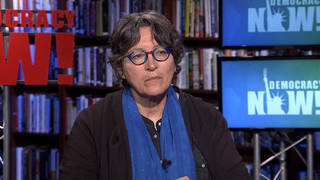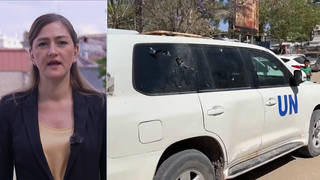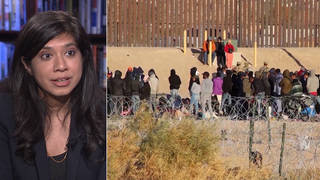
Related
Guests
- Hala Rharritfirst State Department diplomat to publicly resign over the Biden administration’s Gaza policy.
Democracy Now! speaks with Hala Rharrit, the first State Department diplomat to publicly resign over the Biden administration’s policies backing Israel’s assault and siege of the Gaza Strip. Rharrit is an 18-year career diplomat who served as the Arabic-language spokesperson for the State Department in the region. “I could no longer be a part of the State Department and promote this policy. It’s an inhumane policy. It’s a failed policy that is helping neither Palestinians, neither Israelis,” Rharrit says. “We are not authorized to send military equipment, weapons to countries that commit human rights abuses. ICJ has determined plausible genocide, yet we are still sending billions upon billions of not just defensive weaponry, but offensive weaponry. It is tantamount to a violation of domestic law. Many diplomats know it. Many diplomats are scared to say it.” She adds, “I read the talking points that we were supposed to promote on Arab media. A lot of them were dehumanizing to Palestinians.” Rharrit also discusses how “corruption” in government allows for arms sales to continue. “I could not help but be concerned about the influence of special interest groups, of lobbying groups on our foreign policy and, as well, on Congress — on the people that decide whether or not some of those shipments of arms get sent. The bottom line is that our politicians should not be profiting from war. And unfortunately, we have some institutionalized corruption that enables that,” she says.
Transcript
AMY GOODMAN: Israel has killed at least 26 Palestinians in Gaza over the past day, including at least seven people, four of them children, in an airstrike on Rafah, the southernmost city in Gaza, where over 1.4 million Palestinians have sought refuge. Nearly 35,000 Palestinians have been killed over the past nearly seven months, with 7,000 others missing and believed to be buried under the rubble. Nearly 78,000 have been wounded.
A new United Nations report called the level of casualties in Gaza “unprecedented” in such a short period of time. The report also said the world has not seen the level of destruction of housing in Gaza since World War II.
Here in the United States, a massive student protest movement with Gaza solidarity encampments in university campuses across the country has been met with public raids, mass arrests and violence. Nearly 2,200 people have been arrested at 43 colleges and universities in recent weeks. President Joe Biden addressed the protests Thursday for the first time in weeks in unscheduled remarks from the White House.
PRESIDENT JOE BIDEN: Dissent is essential to democracy, but dissent must never lead to disorder or to denying the rights of others so students can finish the semester and their college education. Look, it’s basically a matter of fairness. It’s a matter of what’s right. There’s the right to protest, but not the right to cause chaos.
AMY GOODMAN: As President Biden concluded his remarks, he was asked whether the student protests would prompt him to reconsider his foreign policy.
REPORTER: Mr. President, have the protests forced you to reconsider any of the policies with regard to the region?
PRESIDENT JOE BIDEN: No.
AMY GOODMAN: The Biden administration’s financial, military and diplomatic backing of Israel’s assault on Gaza has sparked dissent within the U.S. government, with resignations and walkouts by government employees.
Today we’re joined by the first State Department diplomat to publicly resign over the war on Gaza. Hala Rharrit is an 18-year career diplomat who recently resigned from the State Department. She’s the third State Department employee, but the first Foreign Service officer, to do so. Hala Rharrit served as the Arabic-language spokesperson for the State Department in the region. She joins us now in her first TV interview since her resignation.
Hala Rharrit, welcome to Democracy Now!
HALA RHARRIT: Thank you so much, Amy. It’s an honor to be with you.
AMY GOODMAN: Can you start off by talking about why you have publicly resigned?
HALA RHARRIT: Absolutely. Honestly, I wasn’t intending to publicly resign. I was intending to resign. My profile at the Dubai Media Hub, my last assignment, was quite high-profile. My role was to speak to Arab media about American policy, so it inevitably made the news when I did resign. It first made the news, I believe, here in the region and in the United States.
But the reason why I resigned is really because I could no longer be a part of the State Department and promote this policy. It’s an inhumane policy. It’s a failed policy that is helping neither Palestinians, neither Israelis. And I want to stress that point, that it’s not strictly the horrific mass killings that we have all been watching over the course of over 200 days, the targeting of journalists, of healthcare workers, over 14,000 children massacred, but it’s also not keeping Israelis any safer. The hostages are still in Gaza. Israelis know that there is going to be a vicious cycle of violence after so many have been killed in Gaza. This does not help anyone.
And the militaristic policy is not the solution. As a diplomat, as someone that believes in diplomacy, in the power of diplomacy, I did everything I could from within to try to explain this on a daily basis, through reports, through cables. Nothing was working, until finally I made the decision that I could no longer be part of the system.
AMY GOODMAN: What do you feel President Biden and your boss at the State Department, Secretary of State Tony Blinken, could do right now that would be most effective?
HALA RHARRIT: They need to abide by national domestic law and international law. We have systems in place within the State Department to ensure situations like this don’t happen. We are not authorized to send military equipment, weapons to countries that commit human rights abuses. ICJ has determined plausible genocide, yet we are still sending billions upon billions of not just defensive weaponry, but offensive weaponry. It is tantamount to a violation of domestic law. Many diplomats know it. Many diplomats are scared to say it. It’s a violation of international law, what we’ve been seeing happening in Gaza.
And we cannot make exceptions for our allies. It does not help our allies to make exceptions, because, again, all that this is doing is creating a vicious cycle of violence. And it has clearly failed its objectives. It has failed. The hostages are still not back with their families where they belong. The situation in Gaza remains intensely unstable. People continue to suffer on a daily basis.
It’s time for President Biden and Secretary Blinken to realize that this militaristic approach has been a failure and they need to stop. They need to abide by U.S. law, and doing so will create a lot of leverage. If we are able to condition military aid, we will be able to pressure Israel. We will also be able to work with our Arab allies to pressure Hamas, to have real, substantive change on the ground. That’s what’s necessary at this time, not more arms.
AMY GOODMAN: Why do you think President Biden does not do that? As he says he’s heartbroken by the number of casualties and he says he admonishes the Israeli Prime Minister Benjamin Netanyahu, clearly the arms flow continues, Washington Post, New York Times reporting on, you know, the well over 100 arms transfers that are made, or arms sales, just under the threshold that would require Congress to approve it.
HALA RHARRIT: Absolutely. You make a very good point, Amy. Right under the threshold, willfully enabling the crimes that are happening in Gaza. And that’s why I could no longer be part of the State Department, because it’s willful.
It’s a very difficult answer to give you, and it’s one question that I ask myself every single day: Why doesn’t President Biden act? Why doesn’t Secretary Blinken act? If I had the answer to that, perhaps I — you know, I’d be somewhere else right now. I’d be within the system still trying to effect change.
But the bottom line to me and what it appeared like to me from within the system, and also as a spokesperson who was reading the talking points, is that, fundamentally, an Israeli life was not worth — or, a Palestinian life was not worth the same as an Israeli life. And it’s heartbreaking for me to say that as someone that has proudly served my country for 18 years. But I read the talking points that we were supposed to promote on Arab media. A lot of them were dehumanizing to Palestinians. Thirty-four thousand people killed in Gaza right now, and we’re still insisting that this is the only option, when it’s not.
Also, as a diplomat, I could not help but be concerned about the influence of special interests, of the arms lobby, of other special interests that serve foreign governments. It is very, very frustrating when you’re working on a daily basis on American foreign policy, but you know that no matter what you do and no matter what very senior officials in the department are doing, and despite all of the recommendations going up to Washington from the field, the policy is not changing. I could not help but be concerned about the influence of special interest groups, of lobbying groups on our foreign policy and, as well, on Congress — on the people that decide whether or not some of those shipments of arms get sent. The bottom line is that our politicians should not be profiting from war. And unfortunately, we have some institutionalized corruption that enables that. And as an American diplomat, my concern was U.S. national security interest. And I protested against this, but unfortunately could not effect enough change, that I had to submit my resignation.
AMY GOODMAN: You mentioned institutionalized corruption. Can you explain that further, Hala?
HALA RHARRIT: It is public knowledge that our politicians are able to profit significantly from the arms industry, from campaign contributions. That is something that is never allowed for a diplomat. We have no ability to gain any financial gain from anything, really. Everything has to be very transparent for us. We obviously have secret — top-secret security clearances. Our lives are really open book when we’re a diplomat. And that’s how it should be, because we’re serving our country. We’re not serving ourselves. We’re serving the people of the United States. We’re implementing the laws of the land. And it should be for the sake of U.S. national security, not for personal gain, not for campaign contributions. And as a diplomat, it was very concerning to me knowing that our domestic system clearly has an influence on our foreign policy, because we were not being heard.
AMY GOODMAN: I wanted to ask you about how the administration, to the highest levels, Blinken and, of course, ultimately, Biden, respond to criticism and how much they hear. The latest news, among a lot of other reports, more than 250 former staffers in the Obama administration and campaign workers for the Obama-Biden ticket sent a letter to their former bosses demanding an immediate ceasefire in Gaza and calling for the U.S. to end its staunch support for Israel. You then have the number of people who have resigned publicly and more privately. I’m wondering their response to you? But have you spoken directly with President Biden, with Tony Blinken, the secretary of State, your, well, previous boss?
HALA RHARRIT: Did you ask, Amy, if I’ve spoken to them directly?
AMY GOODMAN: Yes.
HALA RHARRIT: I have not spoken to them directly, I mean, not in this particular occasion. I have in the past for Secretary Blinken, but not for this particular occasion. But what we do as diplomats is we send reporting. We send information back. That’s why we are overseas in our embassies and our consulates. And our job is to try to help Washington in making informed decisions. We do that. And we do hear from Secretary Blinken. We do hear about a culture of “We want to hear about dissent. We want to hear critical feedback.”
I can tell you that, for me, it was a mixed bag. I provided that critical feedback. I provided daily reports, for example, showing what pan-Arab media was covering in terms of the Gaza crisis, showing how American — there was growing anti-Americanism. Every single day, I could see growing anti-Americanism, which was extremely concerning. And I was trying to raise this on a daily basis to Washington, explaining we need to change course, this is hurting our own national security interests if we maintain this policy. And I was met with silencing. I was met with being sidelined. I was also met with “Thank you for your critical feedback. This is going to the highest levels of our government. We need more of this.” I was met with more silencing, more sidelining. So, for me, it was really a mixed bag.
And I have to be honest that there were people that were trying to ensure that those messages were heard, but at the end of the day and what was the most frustrating is that, in particular, with my particular role as Arabic spokesperson, I explained that our messaging posture was hurting more so than helping us, yet our messaging posture never changed. We’re still using the talking points directed to the Arab world even if it’s inflaming the tensions, even if it’s instigating people across the region, even if it’s making people across the region hate us more and be more frustrated with us, because they hear the double standard. They hear the double standard when we condemn an attack on Israeli interests, but we don’t condemn the death of Palestinians, only show concern. They are very, very in tune with these double standards. And it hurt us to continue to amplify these talking points. And it was very frustrating for me that there was the continued expectation that we would do that despite all of the data, despite the clear proof that it’s not helping America, it’s hurting America.
AMY GOODMAN: You refused to comment — you were the Arabic-language spokesperson to the Arab world. You refused to comment on U.S. policy in Gaza. Can you explain why you made that decision?
HALA RHARRIT: Absolutely. Just as I mentioned right now, I made it abundantly clear, through daily reports, of the ramifications of our messaging. Abundantly clear. I showed every day what was happening, what the reaction was. And I also was monitoring Arab social media and sharing with Washington the images that were going viral across Arab social media. And these — thank you, as well, Amy, for amplifying the voices of the Palestinian families at the top of the hour. Those are things that sometimes Washington does not hear. But it is what the Arab public is consuming on a daily basis. And these pictures of dead children, of maimed toddlers, they’re traumatizing. And my point back was, “Look at these images that people in this part of the world are consuming on a daily basis.”
There is an absolute disconnect with what people in the Arab world are seeing happening in Gaza and our talking points. There’s an utter disconnect. And it does not serve our interest to continue pretending like what’s happening in Gaza is not happening, and we keep promoting things that are just instigating. So, my role was to be a spokesperson, but I also believe my role to be to serve the United States, to advance American interests, to have effective messaging, not just messaging. And I could not in good conscience do something and go out on Arab TV knowing that it was hurting my country doing that, not helping it.
AMY GOODMAN: Explain more specifically, because this is a serious, important critique and charge, that the president, that the secretary of state are actually endangering U.S. national security with the position and the support of Israel that they are taking right now.
HALA RHARRIT: Absolutely. Absolutely. I mean, we had three of our troops killed in Jordan. That was in direct reaction to our Israel policy. And when that happened, I said, again, “I will not be part of this.” And then, if an attack happens on American interests in the region, I would not be able to sleep at night, because my face on that screen, on that Arab news channel, may have been the thing that prompted the person to go and retaliate or commit an act of terror.
The anger in the region is palpable, and it is traumatic. When people are consuming daily images of massacres, of people suffering, and yet they hear that the United States is willfully enabling it by continuing to send bombs, it makes people lose complete faith in the United States. And this is what was so painful to me as an American diplomat. I’ve worked for the last 18 years to strengthen ties between the United States and other countries, to advance U.S. interests, to promote America’s image. But this policy made it impossible. How can we talk about press freedom when we remain willfully silent about the killings of so many journalists? I mean, I personally worked to try to get a statement out on the killing of journalists in Gaza, and I was met with so much pushback. And I was so shocked at my own colleagues that would push back on that. It is a fundamental American value to be promoting freedom of press. We cannot have exceptions. We cannot have double standards.
As American diplomats, we need to apply our values, our standards on the situation. That is what we are supposed to be about. And until we do that, we are hurting — I keep on repeating this word, but I fundamentally believe it, and it’s a concern of mine that I expressed over the course of months. We are hurting ourselves, not just the Palestinians and not just the Israelis, but we’re hurting the United States of America.
AMY GOODMAN: You are publicly resigning, but there are others who have simply resigned, saying they don’t think they’re important enough to announce that they are resigning. Can you talk about the number of people who have left and also who have expressed, like you have, through the official channels, going all the way up, your concern?
HALA RHARRIT: I actually don’t know of any others that have resigned within the Foreign Service. There may be, and I may not know about them, but I do not know of any others, other than Josh and Annelle, who are not Foreign Service officers but were Washington-based, that have resigned. But I know for sure that a lot of people expressed frustrations of wanting to resign.
And I know this mostly from after my own resignation was announced internally. It was quite a surprise to me. I did not know how people would react to me, honestly, when I was still on the inside, because my resignation was announced internally before it became public externally. And at that point, so many people approached me and talked about how they’ve been so frustrated with the policy. They felt like they couldn’t say anything. They felt like they couldn’t do anything. They were worried about their careers. They were worried about if they spoke up internally, what would that do to them? And it was very disheartening to hear. It’s not what the State Department is supposed to be about. Many told me that they wished they could resign, because they really could not keep maintaining every single day under this policy, but that they couldn’t for financial reasons, for other considerations related to their families.
And so, it is a sad time within the department, as far as I’m concerned, and I can only share of my experience, of course. The State Department is a very large institution, but I can tell you, after 18 years of service, you get to know a lot of members of the diplomatic corps. And it’s an unprecedented time. It’s very uneasy. And I think everyone wakes up hoping that the next day will be better. But we really do need some fundamental changes to this policy, because it is such a failed policy that is just hurting all parties involved.
AMY GOODMAN: And your response to President Biden speaking out yesterday for the first time on the college campus unrest, the thousands of students who have been arrested — also professors have been arrested — saying that that protest across the country has no effect on his foreign policy?
HALA RHARRIT: Honestly, I was intensely disappointed that he would speak about constituents in that way, that he would speak about voters in that way, that he would speak about Americans in that way. He is supposed to be a representative of the people.
And the fact that these students have been dismissed, these students have been labeled — the bottom line is, I think there is a fundamental generational shift in not just the United States, but globally, because these students, much like people across this region, have been consuming on a daily basis the images coming straight out of Gaza. They’ve been seeing on their social media feeds the children that have been dying of starvation. They are seeing on their social media feeds the bloody toddlers that are being carried with an arm blown off. They’re seeing this on a daily basis. And it took them seven months to rise. If President Biden, if Secretary Blinken had solved this crisis, there would have been no student protests.
The buck stops with the president. Again, I’m going to say it: It is a failed policy. It has not succeeded in bringing home the hostages. It has not succeeded in making Israelis safer. And when students are seeing a potential, plausible, ongoing genocide, they are reacting to it. They are reacting to the fact that their academic institutions may be financially invested in the killings of innocent people in Gaza. They’re reacting to the fact that their governments — that their government is continuing to enable the killing of innocent civilians. And it is a fundamental democratic right in the First Amendment. And it was very, very disheartening to hear the president just dismissing them that way without even addressing the source of their concerns.
Of course, I am absolutely against any type of violence on campus or anywhere else. It should be inclusive. No students, regardless of their religion, of their race, of ethnicity, need to be targeted whatsoever, and that is clear, and that should go without saying. But it is also clear that there was so much community in these protests. There were Jewish students with Muslim students, with Christian students, with atheists, with agnostics — it doesn’t really matter. People were unified in calling for an end to the carnage and an end to the violence. And suppressing them in such a violent manner is horrific. And it’s also not necessary. Again, as a diplomat, I fundamentally don’t believe in solving conflicts through arms or through violence. I believe in sitting down and talking with individuals, sitting down and negotiating, not in suppression.
AMY GOODMAN: Hala Rharrit, I thank you so much for being with us. Hala Rharrit is the first State Department diplomat to resign over the Biden administration’s Gaza policy. She is an 18-year career diplomat. This is her first television interview since resigning.
Coming up, we speak with two doctors just back from volunteering at the largest functioning hospital in Gaza. Stay with us.
[break]
AMY GOODMAN: “A Place to Stay” by Sam Burton, Palestinian American singer-songwriter form Salt Lake City, dedicated this song to his Palestinian father.












Media Options